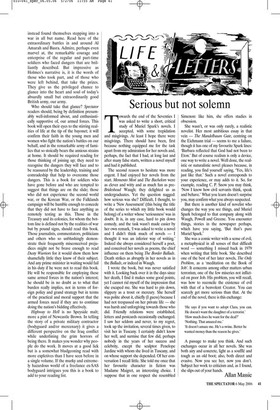Serious but not solemn
Towards the end of the Seventies I was asked to write a short, critical study of Muriel Spark’s novels. I accepted, with some trepidation and misgivings. At least I hope there were misgivings. There should have been, first because nothing equipped me for the task apart from my admiration for her novels and, perhaps, the fact that I had, at long last and after many false starts, written a novel myself and had it published.
The second reason to hesitate was more cogent. I had enjoyed her novels from the start. Memento Mori and The Bachelors were as clever and witty and as much fun as preBrideshead Waugh; they delighted us as undergraduates. Yet the question nagged: how serious was she? Difficult, I thought, to write a ‘New Assessment’ (this being the title of the series to which my little book would belong) of a writer whose ‘seriousness’ was in doubt. It is, in any case, hard to pin down comedy, and the task wasn’t made easier by her own remark, ‘I was asked to write a novel and I didn’t think much of novels — I thought it was an inferior way of writing.’ Indeed she always considered herself a poet, and conceived her novels as poems, the chief influence on them being The Border Ballads. Death strikes as abruptly in her novels as in the Ballads, or indeed in Waugh.
I wrote the book, but was never satisfied with it. Looking back over it in the days since her death, I find it makes some good points, yet I cannot rid myself of the impression that she escaped me. She was hard to pin down, slippery as a trout or mercury. She herself was polite about it, chiefly (I guess) because I had not trespassed on her private life — she was harsh and unforgiving towards those who did. Friendly relations were established, letters and postcards occasionally exchanged. I saw her seldom and never, to my regret, took up the invitation, several times given, to visit her in Tuscany. I certainly didn’t know her well, and surmise that few did, perhaps nobody in the years of her success and celebrity, except the sculptor Penelope Jardine with whom she lived in Tuscany, and on whose support she depended. Of her conversation I recall little. She told me once that her favourite character in fiction was Madame Maigret, an interesting choice. I suppose that in one respect she resembled Simenon: like him, she offers studies in obsession.
She wasn’t, or was only rarely, a realistic novelist. Her most ambitious essay in that vein — The Mandelbaum Gate, centring on the Eichmann trial — seems to me a failure, though it has one of my favourite Spark lines: ‘Barbara reflected that God had not been to Eton.’ But of course realism is only a device, one way to write a novel. Well done, the realistic or naturalistic novel pleases because, in reading, you find yourself saying, ‘Yes, life’s just like that.’ Such a novel corresponds to your experience, or may adds to it. So, for example, reading C. P. Snow you may think, ‘Now I know how civil servants think, speak and behave.’ What you learn doesn’t surprise you, may confirm what you always suspected.
But there is another kind of novelist who changes the way you see things, and Muriel Spark belonged to that company along with Waugh, Powell and Greene. You encounter things, stories in the newspaper perhaps, which have you saying, ‘But that’s pure Muriel Spark.’ She was a comic writer with a sense of evil, a metaphysical in all senses of that difficult word — something I missed back in 1979 when writing that little book. She described one of the best of her later novels, The Only Problem, as a ‘meditation on the Book of Job’. It concerns among other matters urban terrorism, one of the few miseries not inflicted on poor Job. His problem, you will recall, was how to reconcile the existence of evil with that of a benvolent Creator. You can scarcely get more serious than that. At the end of the novel, there is this exchange:
‘He says if you want to adopt Clara, you can. He doesn’t want the daughter of a terrorist.’ ‘How much does he want for the deal?’ ‘Nothing. That amazed me.’ ‘It doesn’t amaze me. He’s a swine. Better he wanted money than the reason he gives.’
A passage to make you think. And such exchanges occur in all her novels. She was both airy and concrete, light as a soufflé and tough as an old boot; also, both direct and evasive. Now you see her, now you don’t. Subject her work to criticism and, as I found, she slips out of your hands.
Allan Massie














































 Previous page
Previous page